The Ultimate Guide to the Best Vegan Omega-3 Supplements
Omega-3 is mostly found in fish and fish oils. As vegans, we choose not to eat fish, but this doesn’t mean we have to go without Omega-3s. We just need a different source.
There are three types of Omega-3s: ALA, EPA, and DHA.
Omega-3 is vital for our health. They help to protect brain function, lower blood pressure, reduce triglycerides, slow development of plaque in arteries, reduce the risk of heart disease and strokes. Omega-3s are considered essential by medical experts all over the world.
Getting ALA is no issue for vegans as many plants are high in ALA, such as tofu, chia seeds, and hemp seeds. Getting DHA and EPA is much more of a challenge.
Thankfully, some brilliant scientists have been able to extract both DHA and EPA from Algae. The same source in which fish get their Omega-3s! Vegan Omega-3s are sold in the form of Algal oil, which is highly effective for getting both EPA and DHA.
Health organizations around the world suggest taking 250mg-500mg of combined EPA and DHA each day.
Here are the best vegan Omega-3 supplements on the market right now.
- The Top 5 Best Vegan Omega-3 Supplements
- Should Vegans Take Omega-3 Supplement?
- What to Look For in a Quality Vegan Omega-3 Supplement
- 3 Ingredients to Avoid in Vegan Omega-3 Supplements
- How Much Omega-3 Do You Need?
- 10 Health Benefits of Omega-3 Supplementation
- What Are the Different Types of Omegas?
- The Bottom Line
The Top 5 Best Vegan Omega-3 Supplements
These top 5 vegan Omega-3 supplements are the best your money can buy.
1. NuTru O-Mega-Zen + EPA
This Omega-3 supplement from NuTru is purely made from microalgae and is 100% vegan safe. The algae are sustainably sourced to help protect the environment. Two soft gels provide you with 300mg of DHA and 150mg of EPA.
This supplement is rated A+ by Labdoor and has 4.5 stars on Amazon.
2. Nordic Naturals Algae Omega
Nordic Naturals is a well-known and respected brand within the supplements industry. This Omega-3 supplement is made from sustainably-sourced microalgae, and two soft gel capsules a day will provide you with 450mg of DHA and 650mg of EPA. The capsules are non-GMO and hexane-free.
3. Garden of Life Minami Algae Omega-3 Vegan DHA
Garden of Life is an extremely popular brand within the vegan community. This Omega-3 supplement is made from marine algae and astaxanthin. Two soft gels will provide you 500mg of DHA. Ingredients are all-natural with no-GMO and no artificial sweeteners, flavors, or chemicals.
4. Source Naturals Vegan True Non-Fish Omega-3s
This all-vegan omega-3 soft gels from Source Naturals is made from sustainable algae and one of the most popular Omega-3 products within the vegan community. Two soft gels provide 360mg of DHA and 180mg of EPA. There is no yeast, gluten, or wheat and contains no sugar, salt, preservatives, or artificial color, flavor or fragrance.
5. Ovega-3 Omega-3 Supplement
This Omega-3 supplement from Ovega is made from sustainably sourced algae. It is gluten-free, GMO-free, soy-free, lactose-free, and sugar-free. Each Ovega soft gel contains 360mg of DHA and 180mg of EPA.
Should Vegans Take Omega-3 Supplement?
Yes! You may come across vegans who claim that vegans do not need to supplement anything at all. They’re wrong and merely being stubborn. Supplementation is crucial as part of a healthy vegan diet, and Omega-3 should be heavily included.
Why is Omega-3 important for vegans? Because we simply can’t get enough DHA or EPA through our plant foods. They’re only available from eating fish. But, fish get their omega-3s by eating algae. So, cut out the middleman (or middlefish) and take an algae omega-3 supplement.
Research has shown both vegetarians and vegans have low levels of omega-3 DHA and EPA. However, it’s not just vegans that need an omega-3 supplement. It’s everyone. The typical modern western diet simply lacks adequate levels of this essential nutrient.
Some vegans believe that they do not require an omega-3 supplement because they eat plenty of ALA-rich foods. Many believe that if they consume enough ALA, their body will naturally produce adequate levels of EPA and DHA.
There have been studies that show eating enough ALA can help increase levels of EPA and DHA. This is your body’s natural response to not getting enough DHA and EPA (vegetarians and vegans).
However, this theory is not concrete, and many medical professionals still advise vegans to supplement omega-3. Only a small percentage of ALA can convert to EPA even less into DHA.
You would need to eat a considerable amount of ALA-rich foods such as chia seeds, Brussels sprouts, hemp seeds, walnuts, and flaxseeds. The required amount of each of those foods is just not realistic for most people.
A simple vegan omega-3 supplement can help you to hit your RDA of all three omega-3s every day.
What to Look For in a Quality Vegan Omega-3 Supplement
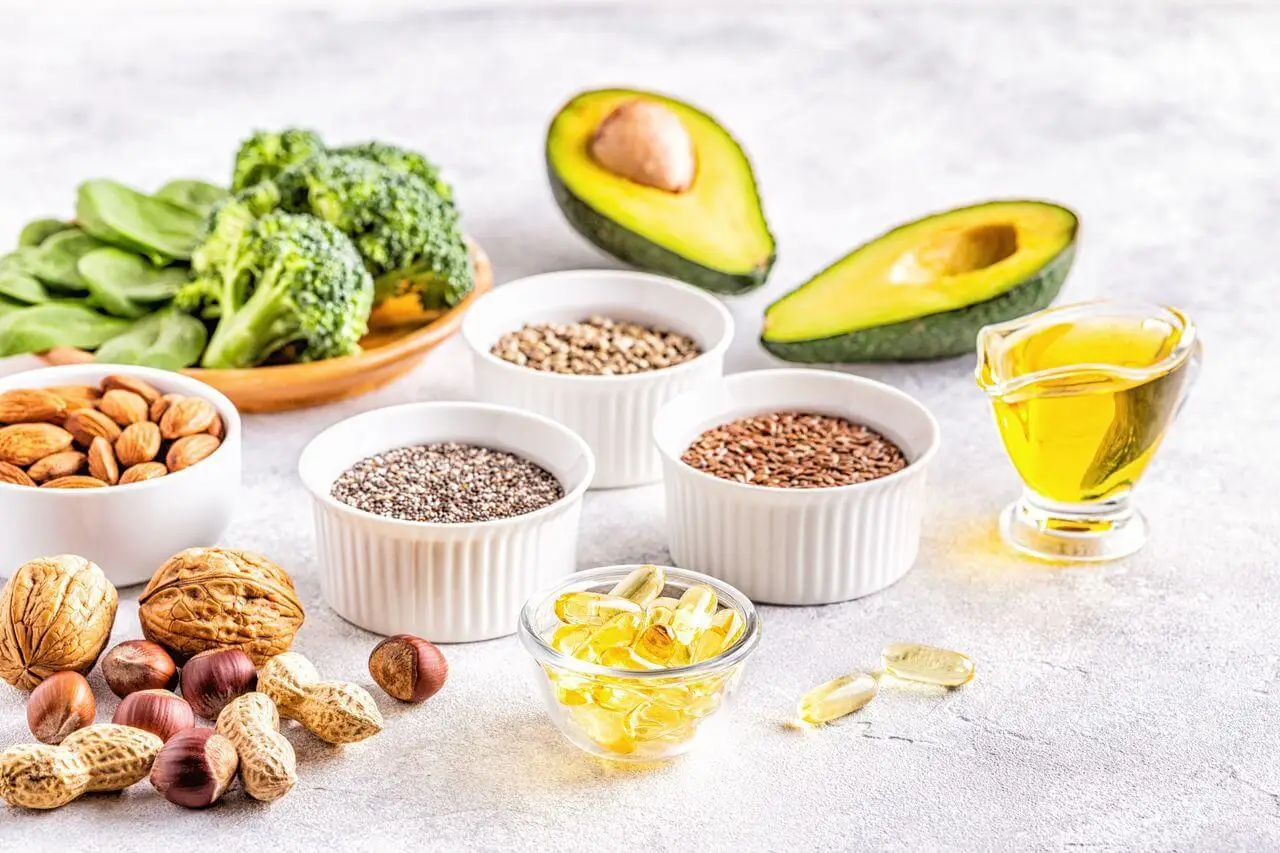
Not all supplements are created equal. Unfortunately, the supplement industry is still vastly underregulated. This means many supplements sold are poor quality and ineffective. However, there are some ways to ensure that you only buy a quality Omega-3 supplement.
- Buy an algae-based omega-3 supplement – Fish get their DHA and EPA from algae, so why not cut out the middleman? Algae is the most effective source of omega-3 for vegans.
- Buy a formula that is free of nasty ingredients – Watch out for heavy metals, toxins, synthetic filaments, and any pollutants.
- High dose of DHA and EPA – You need at least 600mg per day of the two combined for best results.
- Sustainable ingredients – You want quality ingredients that have the least impact on the planet.
- Buy products that are GMP-certified – This means the company follows ethical working standards, and they have been tested by an external third-party independent testing group.
- No artificial flavors – Some algae products can give you fishy burps, flavors can help mask this.
- Check their rating – Labdoor conducts comprehensive testing and research on each product they review. They then grade them from A+ to F.
- Buy from a reputable business – Never buy supplements from dubious sellers. Always buy through an established and trustworthy company.
- Do your own research – Never take anything at face value. Always conduct your own thorough research.
3 Ingredients to Avoid in Vegan Omega-3 Supplements
These ingredients are not vegan. Always make sure you thoroughly read the label of any supplement and look out for the vegan logo or a clear statement like “100% vegan.”
- Gelatin Capsules – made from collagen (boiled down animal bones and ligaments)
- Fish Oil – standard omega-3 supplements are derived from fish oil. Always double-check the product to make sure it’s 100% vegan.
- Carrageenan – this ingredient is the vegan alternative to gelatin. However, it has been shown to cause inflammation in the human body and is probably worth avoiding.
How Much Omega-3 Do You Need?
General Health
Most health organizations around the world state that an average person requires about 250-500mg of combined DHA and EPA per day.
For ALA, men need 1.6g per day, and women need 1.1 grams a day.
Pregnancy and Breastfeeding
Research shows that omega-3s are essential before, during, and after pregnancy, as well as during breastfeeding.
During pregnancy, an extra 200mg of DHA is recommended per day on top of the general DHA requirements stated above. For ALA, pregnant women require 1.4g per day, and breastfeeding women need 1.3g per day.
Health Conditions
If you suffer from certain health conditions, your omega-3 requirement will likely change.
Heart Disease
Studies have shown you can benefit from 850mg of combined EPA and DHA per day for 3.5 years. This resulted in 25% fewer heart attacks and a 45% reduction in sudden death.
Those with coronary heart disease should aim to take 1000mg of combined EPA and DHA per day. Those with very high triglycerides should aim for 2,000-4,000mg daily.
Depression and Anxiety
Studies have shown that high doses of omega-3 taken by those suffering from depression and anxiety helped them improve their symptoms. It’s advised to take anything from 200-2,000mg a day.
Downsides of High-Dose Omega-3 Supplementation
Taking too much or too little of any essential nutrient is sure to have its disadvantages. Omega-3 is no different. Regularly taking far too much omega-3 can result in:
- High blood sugar
- Nosebleeds and bleeding of gums
- Low blood pressure
- Diarrhea
- Acid reflux
- Stroke
- Vitamin A toxicity
- Insomnia
Taking too much omega-3s above the adequate requirements discussed in this article can take a toll on your health. Never take too much of any supplement beyond what your body requires.
10 Health Benefits of Omega-3 Supplementation
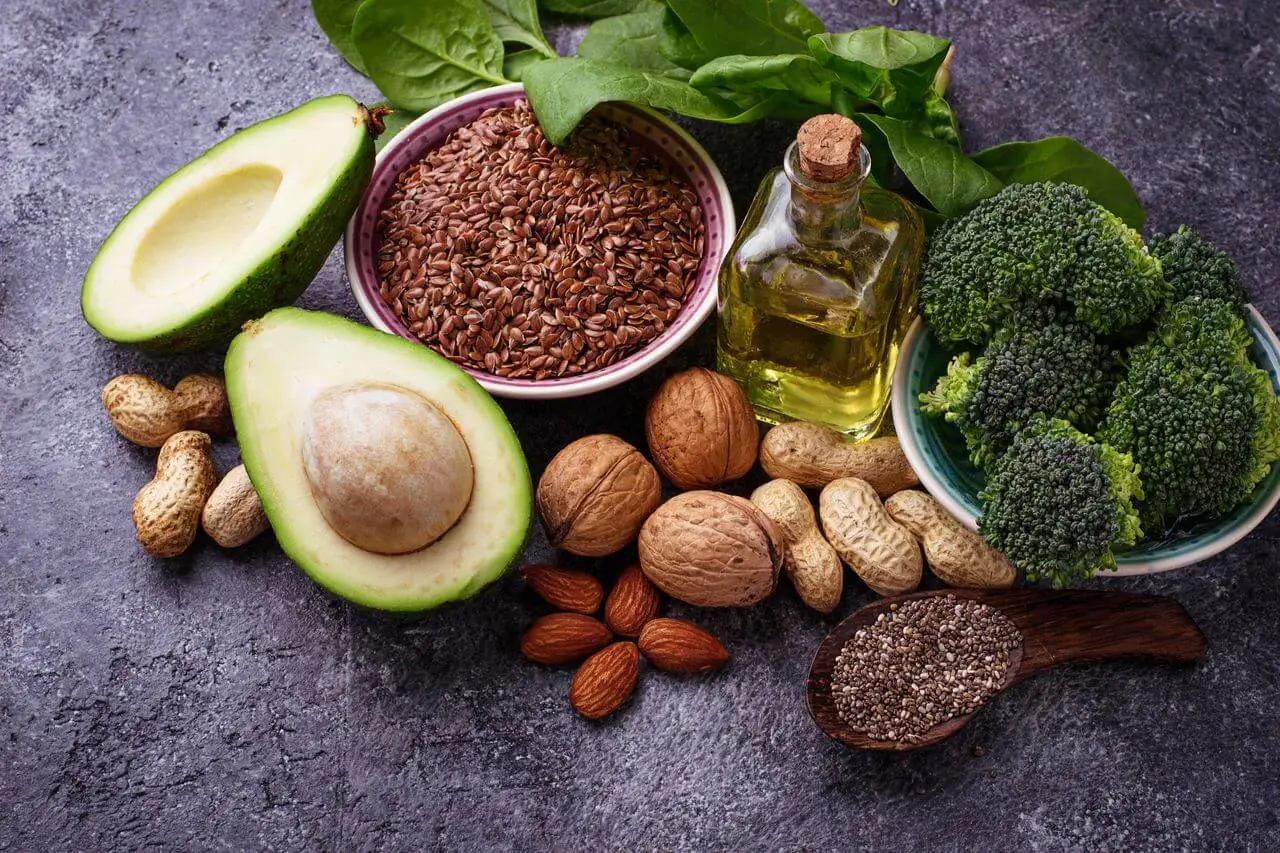
Omega-3 is an essential nutrient for your body. There are many scientifically-backed benefits of getting your RDA of all three omega-3s.
1. Fight Depression
Studies have shown that Omega-3 fatty acids can significantly improve a person’s emotions and fight against depression.
Further studies have shown omega-3 can relieve symptoms of depression from those already struggling with the condition.
2. Promotes Brain Health During Pregnancy and Early Life
Scientists have known for a long time that omega-3 helps improve brain growth and supports healthy brain function. Further studies have shown this is even more significant in women during pregnancy and infants/young children.
DHA is thought to account for 40% of the polyunsaturated fats in your brain.
3. Improve Eye Health
DHA is also believed to account for 60% of the polyunsaturated fats in your retina. This is why those with severe DHA deficiency often have issues with their eyesight.
Research suggests getting enough omega-3 is integral to the development of your eye health and avoiding risks of macular degeneration.
4. Fight Inflammation of the Body
When your body becomes damaged or infected, it’s a natural response if it produces inflammation. But some inflammation can last a very long time, which can be bad for you.
Long-term chronic inflammation can cause pretty much any health condition known to man. From high blood pressure to irritable bowel systems to eczema, and even some cancers. Many studies have found a link between increased intake of omega-3 and a reduction in the inflammation of the body.
5. Reduce Your Risk of Heart Disease
It’s long been observed that the communities around the world that eat the most fish have the lowest rates of heart disease and heart attacks. Coincidence? I think not, and so do many researchers.
Many medical professionals have linked omega-3 to improved heart health. This research created the popularity of buying fish oil supplements. An industry now worth billions. The latest research suggests that omega-3 has many profound effects on our heart health, including:
- Good HDL cholesterol.
- Help to avoid blood clots.
- Lower blood pressure.
- Prevents plaque buildup in arteries.
- Reduction in inflammation of the body.
- Reduction of triglycerides.
6. Help Reduce Symptoms of Metabolic Syndrome
Metabolic Syndrome includes obesity, insulin resistance, high blood pressure, low levels of “good” HDL cholesterol, and high triglycerides.
Research has shown that omega-3s can improve many of the symptoms listed above.
7. Fight Against Age-Related Disease
There have now been several conducted studies that have demonstrated omega-3s ability to help fight against diseases such as Alzheimer’s and mental decline. While brain function decline is inevitable with aging, omega-3 can keep your brain healthier for longer.
8. Improve Bone and Joint Health
Studies have shown that adequate levels of omega-3 can help to reduce your risk of osteoporosis and arthritis. Omega-3 can improve bone and joint strength. Some patients, when supplemented with omega-3, reported that their joint pain reduced and handgrip strengthened.
9. Improve Your Sleep
We all need help with sleep. In our modern age of digital distraction, many of us simply don’t get enough shut-eye. We’re increasingly sacrificing our beauty sleep for video games, Netflix, Facebook scrolling, and YouTube binging.
While changing these things is the best way to improve your sleep, low levels of Omega-3 have been linked to sleep problems also. This is due to low levels of DHA, which helps to produce the hormone melatonin. This hormone is essential for helping you fall asleep.
Turn off the distractions and get your RDA of omega-3.
10. Healthier Skin
DHA helps to increase the health of your cell membranes, which make up a large part of your skin. The healthier your cell membrane is, the softer, more moist, and supple your skin will be.
EPA has also been shown to help hydrate your skin, prevent premature aging, and reduce your risk of acne. Omega-3s have also been shown to improve your skin’s ability to protect you from the sun’s harmful UV rays.
What Are the Different Types of Omegas?
There are three types of omega-3 fatty acids. They’re:
- A-linolenic acid (ALA – found in plant-oils)
- Eicosapentaenoic acid (EPA – found in marine oils)
- Docosahexaenoic acid (DHA – found in marine oils)
The primary sources for omega-3 fatty acids are algae and phytoplankton. Each of the three omega-3 fatty acids plays a vital role in the health of our bodies.
A-linolenic Acid (ALA)
ALA is the most common type of omega-3 fatty acid that you will obtain through your diet. It is mainly used for energy. But a small percentage can also be converted into EPA and DHA within the body. But, this conversion process is highly inefficient.
ALA is found in foods such as chia seeds, hemp seeds, flax seeds, canola oil, walnuts, and soybeans.
Eicosapentaenoic Acid (EPA)
EPA is most commonly found in animal products such as fish and fish oils. It is also found in some microalgae, which is the ingredient vegan EPA supplements are made from.
EPA helps lower triglycerides maintaining and improving heart health.
Docosahexaenoic Acid (DHA)
DHA is an essential structural component of your skin and eyes. Like EPA, it is most commonly found in marine animals and also microalgae.
DHA is considered essential for healthy brain development and function. Some scientists and historians believe that the increased access to DHA for our ancient ancestors is what helped our species to develop our higher intelligence.
The Bottom Line
Omega-3 fatty acids are essential for the promotion of good health. Vegans simply don’t get enough DHA or EPA through their typical vegan diet. Supplementing with a high-quality omega-3 vegan supplement can help make up for any nutritional shortcomings.
Eating plenty of ALA-rich foods will help you boost levels of EPA in your body but should not be solely relied on. Taking an omega-3 DHA+EPA supplement can help give you peace of mind.
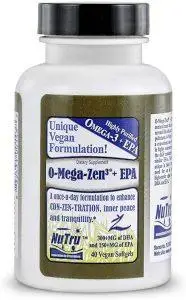
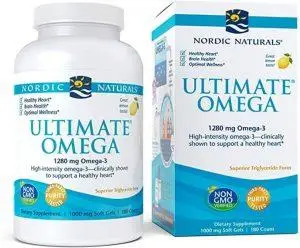
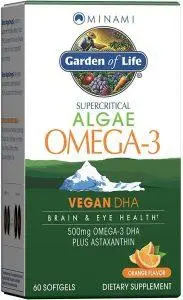
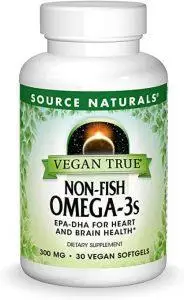




Spelling error report
The following text will be sent to our editors: